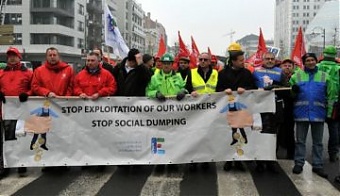Employment, EU – Baltic States, Legislation, Lithuania, Markets and Companies, Transport, Wages
International Internet Magazine. Baltic States news & analytics
Saturday, 20.04.2024, 16:02
Lithuanian firms fear EU plans of equaling wages for posted workers
 Print version
Print version |
|---|
Under the current EU rules, employees sent to other countries should be
paid the minimum salary of the receiving country. Meanwhile, Western countries
propose stricter rules for posted workers to get equal pay and have the same
working conditions with the locals.
"It is no secret that our advantage over the old countries is lower
wages. We do not compete today with our visibility and availability of the
world's best products – we can do things in a cheaper and more flexible way
because of the smaller burden of taxes and wages," Virginijus Ramanauskas, CEO of Lithuania's energy construction
group Enerstenos Grupe (Enerstena
Group), told BNS.
His company currently has contracts in Latvia, Poland, Finland, France and
Denmark. The businessman thinks the new rules may pull down the number of
contracts.
"Bigger costs, bigger cost price and everyone is going towards cutting
costs and prices to be able to sell more. Bigger costs mean lower profits or a
bigger price. If the price is bigger, you get fewer contracts," said
Ramanauskas.
Mitnija, Lithuania's leading construction company that is part of MG Baltic
group, said it understands the temporary character of the advantage caused by
lower wages, therefore, is actively preparing for a "more severe but more
interesting competition."
"The revision of the European Commission's directives into the short
run would, for course, reduce our competition in more developed and wealthier
countries of the European Union, as the price for the labor force is one of the
ingredients of competition. Nevertheless, it is not the only thing that is
important," said Julius Gendvilis,
CEO of the company that has operations in Great Britain and Latvia.
The Western initiatives are most opposed by Poland. Lithuania's
administration also sees threats involved, however, is more reserved and
publicly accentuates it needs to find a proper balance between business
interests and employee protection. A few officials told BNS that the Lithuanian
government tempered its stance after accession of the new ruling majority.
One of the government's key objectives now is to make sure the new EU rules
are not applied for Lithuanian carriers, with a focus on the items included in
the concept of salary, for instance, the accounting of daily allowance.
"We are in support of revising the directive of posted employees
within the EU, with a balance between a competitive and a socially responsible
market. We also believe that the posting restrictions and other market
restrictions should not be applied on the transport sector. We do not support
unilateral initiatives that would fragment the single market in the sector that
is important for our country," Prime Minister Saulius Skvernelis told a news conference in Poland last week.
Member-states usually have different positions of individual ministries,
with economy ministries seeing more threats for businesses, while ministers of
social security and labor taking a positive stance on better protection of
employees. Officials of Lithuanian institutions are currently polishing a
common national stance. Relevant institutions held the last working meeting on
the matter last Thursday, however, no public comments were made.
The tense talks on the new scheme should continue all the way until the EU
summit scheduled for October.








 «The Baltic Course» Is Sold and Stays in Business!
«The Baltic Course» Is Sold and Stays in Business!

